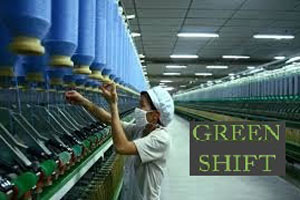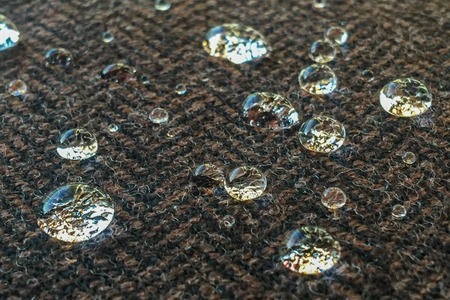
China's green shift momentum growing
YarnsandFibers News Bureau 2017-12-22 17:00:00 – BeijingThe China’s green manufacturing momentum is growing, as a record number of eco-friendly manufacturers showed up at the 2017 Intertextile trade show in Shanghai, although they’re still a niche in a very large market. For the first year they actually labelled factories using eco or organic textiles, so they were easier to find. Although they are still talking maybe just twelve companies, out of thousands there.
A commitment to sustainability is increasingly recognised in China. Wobabybasics, which uses entirely sustainable materials, was hailed as a top sustainable clothing brand by non-governmental organisation Green Initiatives, and studies have shown Chinese consumers are more and more willing to spend on green clothes and products. Green manufacturing is no longer the domain of specialist brands.
Hong Kong-based textiles giant Esquel, the world’s largest shirt maker, has put been putting sustainability at the centre of its business. With sales of US$1.3 billion (860 million yuan) last year, Esquel manufactures over 100 million garments annually for retailers including Marks & Spencer, Ralph Lauren, and Tommy Hilfiger, and has been focusing on building a more sustainable business for both staff and the environment.
Edgar Tung, head of global garment operations, Esquel Group said that this industry has a very bad reputation when it comes to labour abuses, and being able to employ people at the bottom of the pyramid. They really wanted to reduce their impact on the environment and convert people’s perceptions about this industry.
The textile and clothing industry has a long way to go to improve its green credentials. It is the second largest polluting industry globally after oil, accounting for 12.8 million tonnes of textile waste each year, while in China, 17-20% of the world’s industrial pollution and 2.5 billion tonnes of waste water are from textile dyeing and treatment alone each year.
Esquel said that it is determined to show that manufacturing doesn’t have to be fuelled by cheap migrant labour and cost-cutting. A new US$300m garment factory in Guilin has low-energy measures such as natural ventilation, and a commitment to zero discharge of wastewater.
In the last ten years, the company claims to have reduced energy consumption per garment by 45% and water consumption by 64%. A recent Corporate Information Transparency Index, which evaluated 267 brands in China, ranked Esquel as the second-best company textile and apparel company for its green supply chain, and fourth greenest among all companies.
At the recent Integral Conversation sustainability conference in Guilin, organised by Esquel, some of China’s biggest names came together to outline their work in green production. Conglomerate Far Eastern, which has operations in ten major industries including textiles, construction and retail, outlined how it has shifted focus to green materials, including what they claim is the world’s first 100% bio-polyester shirt.
This is the way of the future, said Douglas Tong Hsu, chairman and CEO of Far Eastern Group, They are focused particularly on reduced-chemical products and recycling waste products. Where they have to use new material, they want them to be green materials.
The government is also lending its support to sustainable manufacturing, inaugurating the Green Manufacturing Association of China this year, and driving companies towards automation as part of the ambitious Made in China 2025 plan to modernize the country’s factories. Some of the most polluting factories have already shut down, according to experts, often unwilling or unable to afford the costs of new environment requirements.
According to brands such as Esquel and Far Eastern, they give their staff more training and pay higher rates than the market average to upskill the workforce, which increases productivity per employee.
But significant barriers remain in the green manufacturing sector in China. There’s still a lack of awareness from consumers about how environmentally damaging the industry can be, plus the upfront costs of eco-friendly production are higher and it is difficult to secure reliable green suppliers.
Manufacturers also face stricter standards which haven’t always been adhered to, for example, the Global Organic Textile Standard (GOTS), which considers both environmental and social factors, requires refreshing every year.
And despite the increasing automation of factories, a preference for cheap labour is still common.
Research suggests most Chinese manufacturers are not ready for the next stage of digital, sustainable manufacturing, dubbed “Industry 4.0â€. This new era of smart manufacturing is designed to move China up the value chain, increase productivity through the use of digital technology, and professionalise the manufacturing sector.
Another risk to many manufacturers in the industry is rising wages and growing anger over pollution from consumers and state policy. Many multinational companies are moving production to lower-wage countries with less stringent regulations like Vietnam or Bangladesh. Myanmar’s clothing exports jumped from US$950 million to US$2.1bn between 2012 and 2016, while one analysis for the Federation of Hong Kong Industries trade group suggested the number of Hong Kong-owned factories in the Pearl River Delta fell by a third between 2006 and 2013.
Most of Esquel’s customers are high-end brands, who are under pressure from consumers to deliver better standards. However, Esquel insists that building their green manufacturing centre has actually saved them money in the long run, and that green manufacturing doesn’t have to be the domain of high-end goods.
Although there are more options available, the green shift in Chinese manufacturing is still just beginning, and the only way to really trust a factory’s green credentials is to visit in person and check.
Market Intelligence
Ask for free sample Report

experience
Customer Base
dedicated team
Countries Served Worldwide









